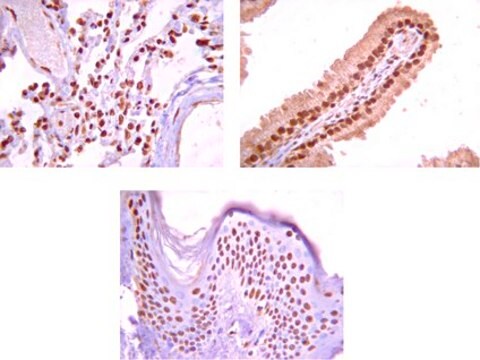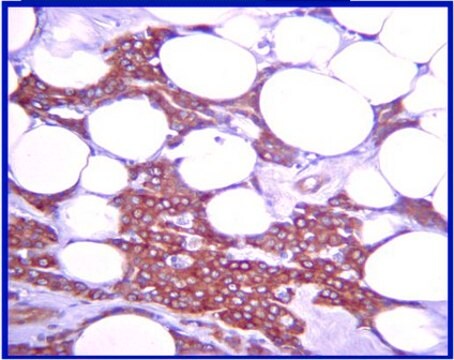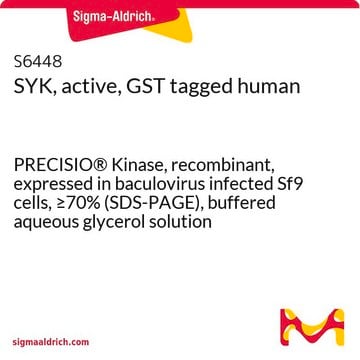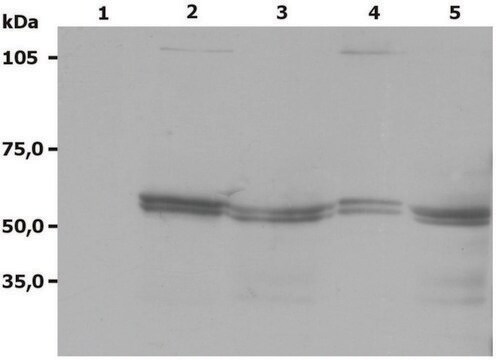Recommended Products
biological source
rabbit
Quality Level
antibody form
serum
antibody product type
primary antibodies
clone
polyclonal
species reactivity
human
manufacturer/tradename
Upstate®
technique(s)
immunoprecipitation (IP): suitable
western blot: suitable
isotype
IgG
NCBI accession no.
UniProt accession no.
shipped in
dry ice
target post-translational modification
unmodified
Gene Information
human ... LYN(4067)
Specificity
two known forms of human Lyn
Immunogen
peptide (NKQQRPVPESQL-LPGQRFQT) corresponding to residues 39-58 of human Lyn
Application
Anti-Lyn Antibody detects level of Lyn & has been published & validated for use in IP & WB.
Quality
routinely evaluated by immunoblot on RIPA lysates from human A431 cells
Target description
53 and 56kDa
Physical form
whole antiserum containing 0.05% sodium azide
Analysis Note
Control
Positive Antigen Control: Catalog #12-301, non-stimulated A431 cell lysate. Add 2.5µL of 2-mercaptoethanol/100µL of lysate and boil for 5 minutes to reduce the preparation. Load 20µg of reduced lysate per lane for minigels.
Positive Antigen Control: Catalog #12-301, non-stimulated A431 cell lysate. Add 2.5µL of 2-mercaptoethanol/100µL of lysate and boil for 5 minutes to reduce the preparation. Load 20µg of reduced lysate per lane for minigels.
Legal Information
UPSTATE is a registered trademark of Merck KGaA, Darmstadt, Germany
Not finding the right product?
Try our Product Selector Tool.
Storage Class Code
12 - Non Combustible Liquids
WGK
WGK 2
Flash Point(F)
Not applicable
Flash Point(C)
Not applicable
Certificates of Analysis (COA)
Search for Certificates of Analysis (COA) by entering the products Lot/Batch Number. Lot and Batch Numbers can be found on a product’s label following the words ‘Lot’ or ‘Batch’.
Already Own This Product?
Find documentation for the products that you have recently purchased in the Document Library.
B M Vonakis et al.
The Journal of biological chemistry, 272(38), 24072-24080 (1997-09-20)
Aggregation of the high affinity receptor for IgE (FcepsilonRI) leads to the phosphorylation of tyrosines on the beta and gamma chains of the receptor by the Src family kinase Lyn. We have studied the interaction between Lyn and the FcepsilonRI
Genetic evidence for a tyrosine kinase cascade preceding the mitogen-activated protein kinase cascade in vertebrate G protein signaling
Wan, Y., et al
The Journal of Biological Chemistry, 272, 17209-17215 (1997)
M E Bates et al.
American journal of respiratory cell and molecular biology, 18(1), 75-83 (1998-02-03)
Eosinophils are potent effector cells contributing to allergic inflammation and asthma. The differentiation, recruitment, and effector functions of eosinophils are greatly affected by interleukin (IL)-5. In the eosinophil, signal transduction pathways including Jak-STAT and Ras-Raf-MAP kinase are stimulated by IL-5
P Kumar et al.
The Journal of biological chemistry, 276(24), 21039-21045 (2001-03-29)
Cellular adhesion molecules such as E-selectin function to recruit leukocytes into the inflammatory lesions of diseases such as rheumatoid arthritis (RA) and atherosclerosis. Monocytes are the key components of the cellular infiltrates present in these disorders. We hypothesized that soluble
J Holland et al.
The Journal of biological chemistry, 272(14), 9108-9112 (1997-04-04)
Intercellular adhesion molecule 1 (ICAM-1) (CD54) is an adhesion molecule of the immunoglobulin superfamily. The interaction between ICAM-1 on B lymphocytes and leukocyte function-associated antigen 1 on T cells plays a major role in several aspects of the immune response
Our team of scientists has experience in all areas of research including Life Science, Material Science, Chemical Synthesis, Chromatography, Analytical and many others.
Contact Technical Service







